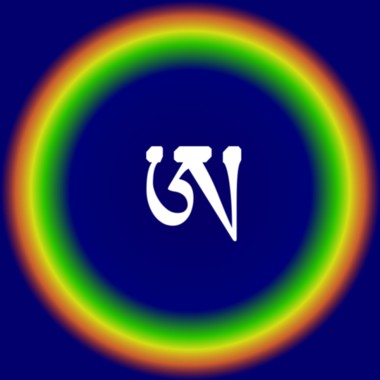Rainbow body: Difference between revisions
Jump to navigation
Jump to search
m (→Other Examples) |
mNo edit summary |
||
| Line 1: | Line 1: | ||
[[Image:Dzogchen A.jpg|frame]]'''Rainbow body''' (Tib. འཇའ་ལུས་, ''ja lü''; [[Wyl.]] '' 'ja' lus'') — fully accomplished [[Dzogchen]] practitioners can dissolve their body at the time of death. | [[Image:Dzogchen A.jpg|frame]]'''Rainbow body''' (Tib. [[འཇའ་ལུས་]], ''ja lü''; [[Wyl.]] '' 'ja' lus'') — fully accomplished [[Dzogchen]] practitioners can dissolve their body at the time of death. | ||
*Through the practice of [[trekchö]], the practitioner can attain the so-called ‘rainbow body’, in which the body becomes smaller and smaller as it dissolves, emanating rainbow light, and finally only the hair and nails are left behind. | *Through the practice of [[trekchö]], the practitioner can attain the so-called ‘rainbow body’, in which the body becomes smaller and smaller as it dissolves, emanating rainbow light, and finally only the hair and nails are left behind. | ||
*Through the practice of [[tögal]], the practitioner can dissolve his or her body into the ‘Light Body’ (Tib. འོད་སྐུ་, ''ö ku''), where the body transforms into light and disappears completely into space. This was done by [[Garab Dorje]], [[Manjushrimitra]], [[Shri Singha]], [[Jnanasutra]] and [[Vairotsana]]. | *Through the practice of [[tögal]], the practitioner can dissolve his or her body into the ‘Light Body’ (Tib. འོད་སྐུ་, ''ö ku''), where the body transforms into light and disappears completely into space. This was done by [[Garab Dorje]], [[Manjushrimitra]], [[Shri Singha]], [[Jnanasutra]] and [[Vairotsana]]. | ||
*Another accomplishment of tögal practice is the ‘Rainbow Body of Great Transference’ (Tib. འཇའ་ལུས་འཕོ་བ་ཆེན་པོ་, ''ja lü phowa chenpo''; Wyl. '' 'ja lus 'pho ba chen po''), where the master dissolves his body into rainbow light and lives for centuries in order to benefit others. Such was the case with [[Padmasambhava]], [[Vimalamitra]], [[Nyang Tingdzin Zangpo]] and [[Chetsün Senge Wangchuk]]. | *Another accomplishment of tögal practice is the ‘Rainbow Body of Great Transference’ (Tib. [[འཇའ་ལུས་འཕོ་བ་ཆེན་པོ་]], ''ja lü phowa chenpo''; Wyl. '' 'ja lus 'pho ba chen po''), where the master dissolves his body into rainbow light and lives for centuries in order to benefit others. Such was the case with [[Padmasambhava]], [[Vimalamitra]], [[Nyang Tingdzin Zangpo]] and [[Chetsün Senge Wangchuk]]. | ||
==Other Examples== | ==Other Examples== | ||
Revision as of 10:01, 8 March 2011

Rainbow body (Tib. འཇའ་ལུས་, ja lü; Wyl. 'ja' lus) — fully accomplished Dzogchen practitioners can dissolve their body at the time of death.
- Through the practice of trekchö, the practitioner can attain the so-called ‘rainbow body’, in which the body becomes smaller and smaller as it dissolves, emanating rainbow light, and finally only the hair and nails are left behind.
- Through the practice of tögal, the practitioner can dissolve his or her body into the ‘Light Body’ (Tib. འོད་སྐུ་, ö ku), where the body transforms into light and disappears completely into space. This was done by Garab Dorje, Manjushrimitra, Shri Singha, Jnanasutra and Vairotsana.
- Another accomplishment of tögal practice is the ‘Rainbow Body of Great Transference’ (Tib. འཇའ་ལུས་འཕོ་བ་ཆེན་པོ་, ja lü phowa chenpo; Wyl. 'ja lus 'pho ba chen po), where the master dissolves his body into rainbow light and lives for centuries in order to benefit others. Such was the case with Padmasambhava, Vimalamitra, Nyang Tingdzin Zangpo and Chetsün Senge Wangchuk.
Other Examples
- Nyala Pema Dudul (1816-1872)
- Khenchen Tsewang Rigdzin (1883-1958)
- Sonam Namgyal (d.1952/3)
- Khenpo Achö (1918–1998)
Further Reading
- Matthew Kapstein, 'The Strange Death of Pema the Demon-Tamer' in The Presence of Light: Divine Radiance and Religious Experience, ed. Matthew T. Kapstein, University of Chicago Press, 2004
- Sogyal Rinpoche, The Tibetan Book of Living and Dying, pages 171-173.